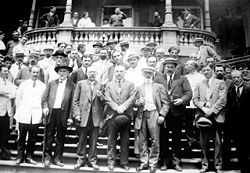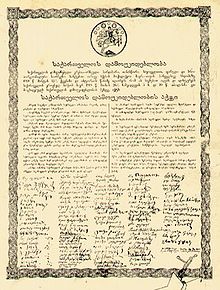- National Council of Georgia
-
The National Council of Georgia (Georgian: საქართველოს ეროვნული საბჭო, sakartvelos erovnuli sabcho) was the first delegated legislative body formed by Georgia's major political parties and social organizations on November 19, 1917, during the Russian Revolution. The Council presided over the declaration of independence of the Democratic Republic of Georgia on May 26, 1918, and was renamed into the Parliament of Georgia (საქართველოს პარლამენტი, sakartvelos parlament'i) on October 8, 1918. It was succeeded by the Constituent Assembly of Georgia, a legislative body elected through the nationwide general elections on February 14, 1919.
Contents
Formation
The National Council of Georgia (NCG) was elected at the National Congress of Georgia held in the State Treasury Theater in Tiflis (now Tbilisi Opera and Ballet Theatre) from November 19 to 23, 1917, and attended by 329 delegates from Georgia’s all major political parties and social organizations, ranging from trade unions to noble assemblies and the church. This was the reaction to the Bolshevik coup in Russia of which Georgia was formally still a part. The Council was dominated by the Georgian Social Democratic (Menshevik) Party and the Menshevik Akaki Chkhenkeli was elected its chairman.[1]
Political role
The Georgian National Council did not initially achieved the influence that its counterparts enjoyed among the Armenians and Azerbaijanis and remained overshadowed by the Tiflis Soviet of Workers' and Soldiers' Deputies – dominated by the fragile bloc of the Mensheviks and SRs – until the formation of the Transcaucasian Commissariat in November 1917.[1]
On May 26, 1918, the NCG declared the independence of Georgia in the form of a democratic republic and assumed the role of the republic's legislature to which the provisional government of Georgia – chaired by Noe Ramishvili and then by Noe Zhordania – was accountable. The expanded NCG was converted into the Parliament of Georgia on October 8, 1918, and Karlo Chkheidze became its new chairman. Under its guidance, the general elections for the Constituent Assembly were prepared and organized in February 1919.[2][3]
References
- ^ a b Jones, Stephen F. (2005), Socialism in Georgian Colors: The European Road to Social Democracy, 1883-1917, pp. 260-261. Harvard University Press, ISBN 0674019024
- ^ Kazemzadeh, Firuz (1951), The Struggle for Transcaucasia, 1917-1921, pp. 119-121. The New York Philosophical Library
- ^ Lang, David Marshall (1962), A Modern History of Georgia, p. 209. London: Weidenfeld and Nicolson
External links
- Collection of documents adopted by the NCG. Regionalism Research Center
National Council (1917–1918) • Parliament (1918–1919) • Constituent Assembly (1919–1921) • Supreme Soviet (1922–1990) • Supreme Council (1990–1992) • State Council (1992–1995) • Parliament (since 1995)Categories:- History of Georgia (country)
- Defunct unicameral legislatures
- 1917 establishments
- 1919 disestablishments
Wikimedia Foundation. 2010.


